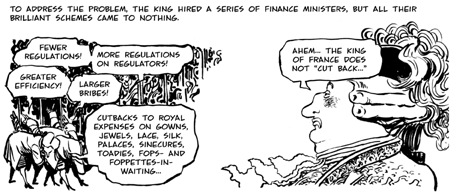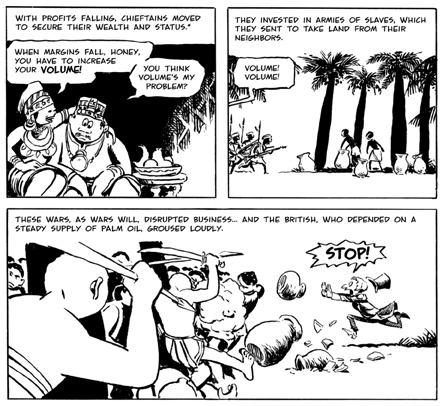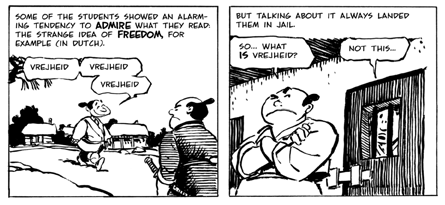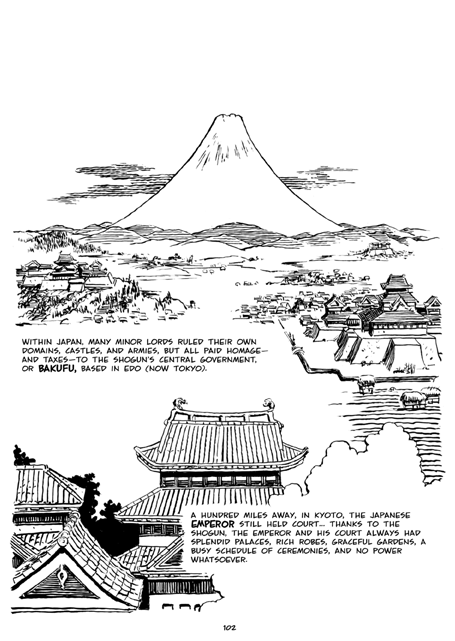For the past 30 or so years, Larry Gonick has been engaged in what has to easily be one of the most ambitious comics projects ever: The Cartoon History of the Universe. In four volumes (including Vol. 1 of The Cartoon History of the Modern World), Gonick has relentlessly relayed the history of planet Earth as we know it, from the big bang up to the the 1700s. That he's done so in such a consistently entertaining and downright funny fashion, is nothing short of remarkable, especially considering the plethora of dull, insipid nonfiction comics that have come out in the past few years.
Now, with the publication of the second volume of Cartoon History of the Modern World he's finally finished his magmum opus. I used the occasion as an opportunity to talk with Gonick over email about his new book -- which runs from the French Revolution to 9/11 -- and how it feels to finally be finished something that took up such a large chunk of his working life. Here's what he had to say:
How long exactly have you been working on this History of the Universe project? I know the first book was published around 1990, but you were serializing it as comic books long before that, correct?
On and off, since 1978. That's when the first Rip Off Press edition of #1 came out. But not full-time. I fitted quite a few science books in there too. Rip Off (best known as publishers of The Fabulous Furry Freak Brothers) did nine 48-page comics, which ran through the first installment about ancient China. Even though I stopped doing the individual comics, I kept the 48-page volume structure, both as a discipline for myself (it helps structure the narrative), and I suppose because it still holds out the possibility of bringing them out as individual comics again.
Now that you've finally completed this lengthy project, how do you feel? Are you happy to be finally done or a little sorry that it's now over?
Proud and exhausted. It's a weird feeling, knowing that a "lifetime project" is done. Like, what's supposed to happen to the rest of the lifetime?
It seems as though one of the major themes of this final book is colonialism and imperialism and its effect on the modern world. Was that a conscious thread you deliberately brought to the fore or did it just claim dominance naturally as you worked on the book?
You are correct, it's a major theme, consciously chosen. It would be hard to imagine a history of the modern world without it. After all, before 1500 Europe was just one small end of one big continent. By 1750, Europe dominated the Americas and India. By 1850, China. By 1880, Africa. At the same time, European ideas, both political and economic, spread around the world. If that's not the story, what is? Then came decolonization, beginning with the American Revolution, and slowly making its way to all the protectorates and subject territories everywhere, with a final acceleration after World War II. Despite the loss of overt political power, though, western nations maintained economic sway over the Third World, and now, today, I think we're seeing even that eroded.
Can you talk a little about the research for this book and how it compared to past books in the History series? I would imagine, for example, that you had considerably more visual reference to go on than previously.
More visual references and more textual references — and on the Worldwide Web!!! It's so much easier to do research now than it used to be. I love Wikipedia so much, I want it to have my baby. Of course, the presence of this great mass of stuff just means I have to throw away more. People who are used to seeing book-long treatments of World War II may be disappointed that I whizzed through it in "only" 6 pages. But I was trying to keep something like the pace and level of detail of previous volumes. Just because something is recent doesn't mean it's bigger. It only looks that way because, well, because it's closer.
Apart from the issues of imperialism and colonialism, were there other themes that you wanted to explore in this final volume?
Well.... it's funny. When I organize the material, I'm not thinking so much about themes, at least not in any organized way. Mostly, I'm looking at narrative coherence and storytelling. However, I must have been thinking about something, because I gave so much space, for example, to slavery and its abolition. I think we can tease a couple of themes out of that topic.
One is the idea—and reality—of progress. Abolitionists, while they were often motivated by moral considerations, lived in a time when the society at large was receptive to their message. Somehow, the advance of science and technology, the wealth that came from factory production and overseas trade, and the development of enlightenment ideas about human nature—essentially sociable and good, not the victims of Original Sin—produced a government that saw abolition as good policy. I tried so show how these threads were woven together by describing the origins and progress of the abolition movement itself, along with an account of how Britain was able to afford to do it: by banning the trade to all nations, Britain was displaying its power on the open seas, and when slavery itself was outlawed in the British Empire, the profits from the opium trade with China were enough to buy off nearly every slave owner in the West Indies.
Progressive ideas also include what I called the "sciencey" ideas like Marxism, Freudian psychology, fascism, and free-trade classical liberalism.
Another theme would be the movements that appeared atavistic to people who considered themselves modern: "reversions" to ethnic nationalism and religious politics. Progressives never cease being surprised by that stuff, even though it never really went away.
What, if any, themes, other than the thread of human history, do you feel draw all these books together. Is there any overarching idea or issue that ties them all up in a neat bow?
Oh-boy. Something like what I just said: that ideas and material and social conditions are all balled up together. That nobility and self-interest are often fused. And above all, that those historical figures you read about in boring old history books were living, breathing, fools like the rest of us. I want to dispel what you might call the Historical Fallacy, which is to view past actors as if they knew what was coming next.
What was the toughest era or event to portray? I imagine there were plenty of times where, when faced with a particular event you thought "How am I going to draw that?"
No, drawing events is rarely hard. Comics is designed for drawing events. You have characters, setting, and action. It's making drawings to illustrate abstract ideas that's hard. My one-page account of Das Kapital, for example. I have to confess that though I think it goes some way towards doing the job, it could be better. Anyway, it was a challenge.
I know in my high school history classes as we got closer to modern times the faster and more generalized the lessons would become, usually because we were nearing the end of the semester. Were you at all concerned about covering too much ground too quickly, and if so, how did you attempt to compensate for that?
I wasn't so concerned about it (tho I probably could have used about 35-50 more pages), but I expected some complaints. That's because people are used to reading big fat books about recent events that loom large simply because they're close to us. (It's like perspective, isn't it?) I wanted to maintain something like the same pace that I'd used throughout the series: give ample space to selected topics, like the abolition of slavery—because it was just about historically unprecedented—and whiz by others with a summary. So I did World War II in six pages, which is actually a lot for a war in the Cartoon History, but it probably looks paltry to a modern reader.
In doing your research for this book, was there anything you came across that surprised you or challenged your preconceptions? Was there anything you weren't initially planning on putting in the book, but, upon discovering it said "Oh, that has to be included."
What preconceptions?
Either I'm so old that my world view is fossilized, in which case challenges bounce off like ping-pong balls, or else it's become so plastic and squishy that they sink in like a fly into a blob of tree sap. No, nothing major.
One thing that had always baffled me was why World War I should have started in the Balkans. No offense, Serbia, but who cares about Serbia? As usual, this mystery is cleared up once you include the Turks in your history (as traditional history rarely does enough). The Balkans were the Austrian/German link to Asia, and in particular I had no idea what a furor was raised by the prospect of a German-built railroad from Constantinople to Baghdad. In the end, of course, the railroad was built, and after World War I it became the famous Orient Express, but not in German hands!
Conversely, was there anything you wanted to get in the book but weren't able to due to space constraints?
Too many things to name.
Do you have a particular favorite character or period in this book? It's natural for cartoonists to be skeptical but I was wondering if there was anyone you felt was worth their reputation?
I enjoyed dusting off my Nixon. It had been a while. But he doesn't get much play here. Of the truly great, I'd have to put Gandhi at the top. The anti-slavery activist Granville Sharp was pretty amazing too. But I also like drawing characters with mixed motivations. Here Napoleon comes to mind. It was never hard drawing a panel with Napoleon in it! And Bolívar.
Now that you've finished this immense project, what are you doing for an encore? More history books?
Right now I'm trying to figure out how to spend the rest of my life, and working on The Cartoon Guide to Calculus during the breaks.
Does history present different sorts of challenges as opposed to doing a book on calculus or science? Are there different sorts of things you have to keep in mind depending upon what sort of nonfiction subject you're tackling?
Sure, there are differences. History comes naturally, because it's mostly stories. In science, the material has to made "storylike." In mathematics, as I'm discovering now, it's especially challenging because there's not much you can make into a character. At least in chemistry there are atoms and molecules! In math, there are mostly formulas and diagrams.
On the other hand, there are similarities too. I'm always trying to make everything as clear as possible.
What kind of reaction has your History series gotten outside of the comics world? Have librarians or teachers noticed it at all? What about historians? Or the general, noncomics reading public?
Very positive. As a matter of fact, there's a new school of history called Big History or New World History, some of whose practitioners hark back to the Cartoon History of the Universe as inspiration. As one history professor wrote (by email, today, in fact!), "you understood early that world history needs to start with the Big Bang." On my web site, you can find a partial list of academic institutions that have used my books. As for reactions from the public, it's hard to say whether any given fan reads other comics or not. I do know that some readers weren't comics fans originally, like, um, Jackie O, my editor at Doubleday.
When you started out doing this, no one was tackling nonfiction, let alone history, in comics. Now it seems like every publisher under the sun is coming out with a graphic novel biography or "how to" guide of some sort. What do you make of this surge of interest in these types of comics? Do you see your influence in any of them?
When Doubleday was considering whether to publish the first Cartoon History of the Universe collection back in about 1988, the sales department was extremely skeptical. Since then, I guess the industry has decided the medium has some potential! I don't know if my precise style is influencing many other cartoonists, but nonfiction comics do seem to be shouldering their way onto the shelf.
As an addendum to that, do you still get people who find your work a novelty ("gawsh, a comic that isn't about superheroes") or do you think we're finally past the whole "Comics as legitimate tool? Who'd have thought" phase?
Yes, there are still people like that. The reaction that always galls me is "These are great! why haven't I ever heard of you?!" Of course, it's a thrill to be admired, but I can't help feeling that there's something about my particular approach that bypasses those Serious Commentators who want their Literature Serious, even Morbidly Serious. Let's be frank. Why isn't somebody at, say, the New York Times saying, "This is one of the greatest accomplishments in the history of comics"? Because (he said modestly) isn't it?





